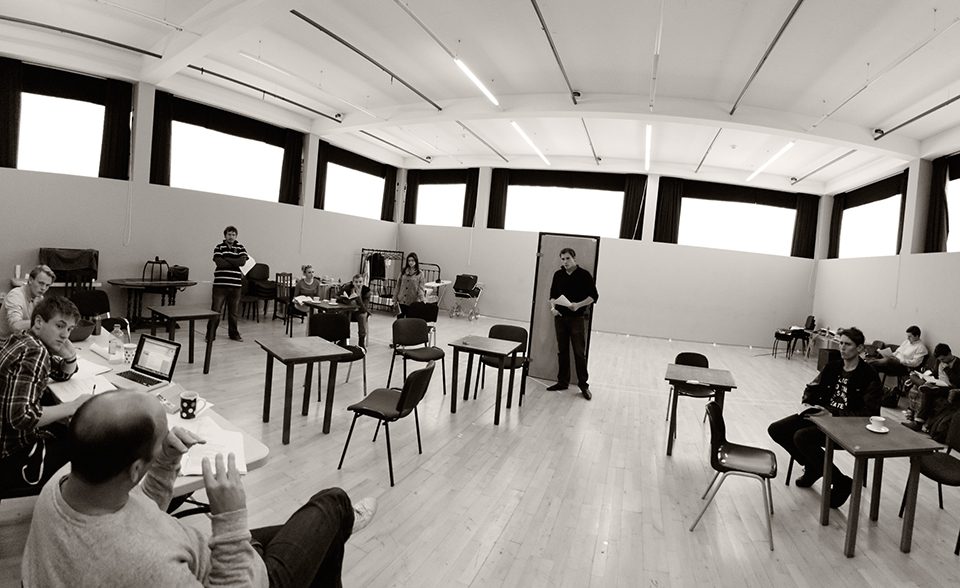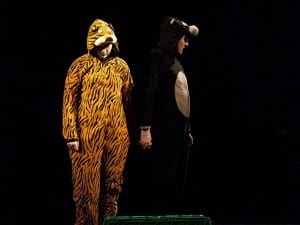In October 2011, Edward Bond’s seminal play Saved returned to London for the first time since 1984, provoking questions about the nature of violence in our society.
Violence is a controversial subject. It exists in a range of guises, from global, large-scale wars to trivial domestic disputes; however, it is continually present in our society. The reasons and excuses for violence are manifold and discussions about the nature of violence are ongoing. It is not easily explained but neither can it be ignored.
British playwright, Edward Bond (b. 1934), offers some enlightening thoughts on violence in the preface to his play, Saved (1967). Though the primary focus of Bond’s understanding of violence is that “the cause and solution of human violence lie not in our instincts but in our social relationships.” Bond rejects the idea that violence is ingrained in humankind and argues instead that its expression always relates to social injustice and threats to human dignity. This is a view later echoed by other critics, such as prison psychiatrist, James Gilligan, who states in his writings on violence that he perceives it always to be “provoked by the experience of feeling shamed and humiliated.”
Bond’s play, Saved, famously contains a great deal of violence: there is a notorious scene involving the killing of a baby by a group of boys, which was enough to get the play banned outright on its release. The Royal Court produced the play regardless and it became one of the productions instrumental in ending theatre censorship in Britain. The boys in Bond’s play belong to a social system that they feel no connection to; they are disenfranchised and vent their frustration through aggression and anger. Bond suggests that the structure of capitalism is built upon this cyclical violence: the violent behaviour of the underclass provides justification for the ruling classes to further deepen the social divide. This injustice is then the foundation from which aggression grows.
Saved has not been shown in London for almost 30 years but this October the play will run at The Lyric Hammersmith in a new production directed by Sean Holmes. It is impossible to avoid the significance of this timing. London is still gathering itself after the onslaught of the August 2011 riots and there is a sense of bewilderment about the violence that sprang up, seemingly unprovoked. In the preface to Saved, Bond speaks of an “unidentified discontent” that plagues the young men in the play; it is a term not unfitting for the riots. The reasons why each of the individuals involved in the riots acted as they did are perplexing, and sometimes puerile but, as Holmes identifies: “The reason it was so disturbing was because it told us something about our society.” And it was something that we hadn’t necessarily realised was there; an “unidentified discontent.”
There are clear parallels with the play, but Holmes is adamant that the socio-political content has meaning that transcends the riots: “The relevance of Saved is highlighted by the riots, but its relevance has always been there.” What is unsettling about the scene with the boys and the baby is that it forces us to ask questions about the society we live in, in the same way as the riots shook the foundations of what we understood as society. However, the themes of the play are not reserved for these extraordinary events, when the anger rises to the surface, but instead demonstrate the inherent violence in the system. Sean Holmes is more interested in the rest of the play, which he suspects people may have forgotten, as he hopes it will surprise people and connections will be formed between all scenes and the famous scene. Simply remembering that scene out of context does not offer the same profound insights as the play complete: violence is, in fact, far more everyday, it exists in the very fabric of our social structure. “The play is full of acts of violence. Whether it’s leaving the baby to cry in scene four and ignoring it; or whether it’s Harry cutting the bread in scene 11 or the threading of the worm onto the hook at the beginning of scene six.”
The violence in the play is pervasive but also, with some exceptions, fairly banal. It is a difficult play, with its inhumane moments, but there is something very solid and very familiar about it: “On one level it is about cups of tea and the absurdity of arguing over whose teapot it is, and at the same time that argument is about something incredibly profound and human and difficult that we all recognise and understand.” It is a play that asks questions of the audience and even Bond continues to question the motives and intents of his characters. Speaking passionately about the dialogue that has emerged between the parties involved during the rehearsal process, Holmes comments: “It has been brilliant having Edward in the room: the questions he asks and the questions we ask are very stimulating about why the characters behave in the way they do.”
Edward Bond is often, perhaps unfairly, portrayed as an “uncompromising artist” and his work has been more welcomed on the French stages than the English over the last decade. However, he did retain a partnership with the Birmingham-based Big Brum Theatre in Education company, for whom he wrote a number of different plays targeted towards a younger audience and there looks set to be renewed interest in his work with The Lyric’s Edward Bond season. Saved is the first of a set of four plays being produced by the theatre, and it will be followed in April by Chair (originally written for radio and broadcast in 2000), Have I None (2000) and The Under Room (2005) (both originally written for Big Brum). Have I None will be directed by Sean Holmes, whilst the other two will be directed by Bond.
Unlike Saved, these three plays are set in the future world of 2077 and deal with the possibilities of society: “With Saved you see society as it was then; with the later works you are looking at the potential for it, what it might become.” Despite the often grim reality of Bond’s plays, there is a glimmer of hope offered: the end of Saved suggests redemption, or at least optimism, with the fixing of a broken chair. Chairs feature in all the Bond plays showing at The Lyric and Holmes explains how they demonstrate Bond’s ability to “give very ordinary objects extraordinary stage presence and power.”
If the riots across Britain were symptomatic of a growing disillusionment with society and a lack of community engagement, then Bond’s plays throw this into relief. His works explore the relationship between young people and authority and offer political commentary. The showing of Saved and the other plays at The Lyric will open up a dialogue around these topics, forcing questions that should have been asked long ago. The Lyric Hammersmith maintains a strong connection with its community and runs Free First Nights to all its main house shows for those who live or work in Hammersmith and Fulham. This community-minded approach proffers something of an antidote to the social discontent demonstrated by the London riots, and the production of a play like Saved urges the audience to examine society more closely, in order to better understand the violence that lurks beneath the surface.
Bond identifies the heart of this comprehension: “In Saved the young men commit their murder in the park in order to regain their self respect. Anyone who does not understand this cannot understand the contradictions and torments of living in a modern city, or write meaningfully about the play, or teach it usefully to students, or understand their own society or even properly understand themselves. And in particular they cannot understand the recent riots – or know where they will lead.” Bond is not suggesting that self-enlightenment is offered by the play, but rather that in recognising, or at least trying to recognise, why his young protagonists act as they do, we can learn something fundamental about our own society.
Saved ran at The Lyric Hammersmith from 6 – 12 October 2011, followed in April 2012 by Chair, Have I None and The Under Room. www.lyric.co.uk
Bryony Byrne





